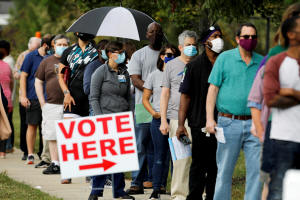These voters sat out in 2016. Now they could determine the next U.S.
president
 Send a link to a friend
Send a link to a friend
 [October 21, 2020]
By Andy Sullivan and Jarrett Renshaw [October 21, 2020]
By Andy Sullivan and Jarrett Renshaw
(Reuters) - Iowa resident LeAnne
Putman-Thomas has watched her country pursue wars, endure recessions and
elect its first Black president. Yet the 53-year-old never felt
compelled to vote.
That changed this month, when she went to an early voting center to cast
a ballot for Democrat Joe Biden - or, more accurately, to vote out
Republican incumbent Donald Trump.
"His presidency has ignited something bad that was festering in this
country," said the self-employed embroiderer, who lives in Adel, a small
town of 5,500 people outside Des Moines. "I want to be part of the
solution."
If Biden defeats Trump in the November presidential election, voters
like Putman-Thomas could be a big reason why.
Opinion polls and early voting returns indicate that millions of
Americans who typically don't participate in elections are coming off
the sidelines this year and backing the Democrat by wide margins.

Roughly 7.3 million infrequent and first-time voters had cast their
ballots as of Tuesday, according to TargetSmart, a Democratic analytics
firm. That's more than two and a half times the number of ballots cast
at the same point four years ago, the data show, as states have expanded
absentee and early in-person voting options due to concerns about the
coronavirus pandemic.
TargetSmart estimates that this group leans Democratic by 16 percentage
points.
"If we want to look at it in terms of who has more intensity and where
does the advantage lie, it's in these infrequent and first-time voters,"
said TargetSmart Chief Executive Officer Tom Bonier.
Republicans caution not to read too much into those numbers as this year
could also see higher participation rates by white voters without a
college degree, a key Trump constituency.
"I would caution against saying this is exclusively a Biden electorate,"
said Patrick Ruffini, a co-founder of Echelon Insights, a Republican
analytics firm.
It's another twist in a precedent-shattering presidential campaign that
has already seen more than 35 million people cast ballots with less than
two weeks to go before Election Day on Nov 3.
Democratic strategists believe their party has the advantage in
mobilizing infrequent voters this year, in part because of Trump's upset
victory in 2016. A combined 78,000 votes across three battleground
states - Michigan, Pennsylvania and Wisconsin - allowed Trump to snatch
an Electoral College win over Democrat Hillary Clinton despite losing
the popular vote by almost 3 million votes nationwide. The U.S.
presidency is clinched by winning a majority of the 538 votes
apportioned to the 50 states and Washington D.C. in the Electoral
College.
That razor-thin margin has haunted some of those who stayed home, said
University of Wisconsin political science professor Barry Burden.
"They feel stunned by what happened four years ago and surprised,"
Burden said. "And so they are trying to make up for their past sins this
time around."
The Trump campaign meanwhile is running an aggressive operation to
engage infrequent voters in battleground states. In Pennsylvania, for
example, volunteers are going door-to-door to talk with these voters and
provide information on how to cast ballots and where. The effort has
helped the party gain 200,000 net new registered Republicans since 2016,
Pennsylvania voting records show, shrinking a long-time Democratic
registration advantage in the state to the lowest level since the 1970s.

A similar push in Florida and North Carolina has likewise eroded
Democrats' historic voter registration advantage in those states,
official figures show.
"There's just no way the Democrats can spin this. We dominated them when
it comes to getting new voters," said a senior campaign official who
spoke on condition of anonymity.
In an era of political polarization, analysts say infrequent voters
across the political spectrum could determine who sits in the White
House next January.
Patrick Sebastian, a Republican strategist with the firm Majority
Strategies, said both parties are enjoying strong support from their
core voters but can’t rely on them alone.
“The party that can best motivate low-propensity voters will likely win
the election,” Sebastian said.
OFF THE SIDELINES
Roughly 40% of eligible Americans typically don't vote in U.S.
presidential elections. The 2016 matchup between Trump and Clinton fit
that pattern.
Americans cast a record 137 million ballots that year, according to
University of Florida political science professor Michael McDonald.
Still, another 100 million eligible adults did not participate.
In surveys, nonvoters cite a variety of reasons, including disinterest
in politics, distrust of the U.S. government or a lack of identity
documents required in some states to cast ballots.
Some experts predict turnout could be significantly higher this year as
Trump's polarizing presidency has galvanized voters across the political
spectrum, including millions who stayed home four years ago. McDonald
predicts as many as 150 million ballots could be cast in 2020.
Several opinion polls show that irregular voters who are likely to show
up this year are backing Biden by wide margins.
[to top of second column]
|

Voters wait in line to enter a polling place and cast their ballots
on the first day of the state's in-person early voting for the
general elections in Durham, North Carolina, U.S. October 15, 2020.
REUTERS/Jonathan Drake/File Photo/File Photo

An October survey by the nonpartisan Pew Research Center showed
Biden leading Trump by 16 percentage points among those who didn't
vote four years ago, double his 8-point lead among those who cast
ballots that year.
Likewise, a September poll by the University of Wisconsin Elections
Research Center found Biden leading Trump by 27 percentage points
among 2016 nonvoters in Wisconsin, Michigan and Pennsylvania, the
three states that handed Trump his unexpected Electoral College win
four years ago.
Among such voters is Lori Edmison, 59, of Little Falls, Wisconsin.
After supporting Democrat Barack Obama twice, the part-time retail
worker said she couldn't muster the enthusiasm to vote for Clinton
in 2016 because "I just don't trust her."
Edmison said she's not wild about Biden either, but she has already
mailed in her ballot for him, motivated by her disgust with Trump.
"For the most part, I did it just to get Trump out," she said. "He
lies about everything, he doesn't care about the small people, only
his rich and powerful friends. The list just goes on and on."
In the battleground state of North Carolina, registered Democrats
who didn't participate in 2016 have cast more than 167,000 ballots
so far, according to a Reuters analysis of state data. That's nearly
twice the 94,000 registered Republicans who have voted early after
sitting out 2016, and ahead of the 140,000 unaffiliated voters who
did the same, the figures show.
Local Democratic officials elsewhere report similar figures.
"We are seeing massive enthusiasm and we are attracting new voters
to the table," said Bryce Smith, Democratic Party chairman of Dallas
County, Iowa, a county outside Des Moines. He said 14% of the
county's registered Democrats who have either voted early or
requested a mail ballot didn't vote in 2016.
In South Carolina, 15% of registered Democrats who requested mail
ballots though the state party's online portal didn't vote in 2016,
according to a party source. In Montgomery County, Pennsylvania,
outside of Philadelphia, that figure is 21%, according to an
official there.

DOOR-KNOCKING AND CAMPAIGN RALLIES
Republicans say those early-voting turnout figures mean little. What
counts, they said, is the final tally, and they expect more of their
supporters will vote in person on Election Day.
While the coronavirus pandemic has prompted Democrats and
nonpartisan groups to scale back in-person voter registration
drives, Republicans have pushed ahead with door knocking and
face-to-face contacts to gin up enthusiasm from the base, and among
those who vote only sporadically or have never cast a ballot.
Majority Strategies, a Republican analytics firm, said in an Oct. 13
report viewed by Reuters that independent voters who have not yet
voted in six places - Florida, North Carolina, Pennsylvania,
Michigan, Wisconsin and Nebraska's second congressional district -
are more likely to vote Republican than those who have already cast
ballots, but they're harder to turn out.
A major draw for these elusive voters are Trump campaign rallies.
Around 23% of attendees at an Oct. 13 rally in Johnstown,
Pennsylvania had never voted, while that figure was 30% for the
audience at Sunday's event in Carson City, Nevada, according to a
Trump campaign official.
The campaign said it plans to follow up in person with those
attendees in coming days. "When we send a voter registration form or
a ballot to someone’s house, we are knocking on their door to remind
them. That’s the difference, Democrats are not,” the official said.
Others have decided on their own to come off the sidelines. Anita
Cripps, 59, of St. Petersburg, Florida, says she plans to vote for
Trump on Election Day - which would be her first time voting since
1988. Cripps said she's well aware of his shortcomings: "Everybody
knows he's a liar," she said.

Still, she said Trump had handled the pandemic as responsibly as
anybody could have. And she's leery of increased government
involvement in healthcare, a key plank of the Democratic platform.
"I really got a bad feeling about Biden, I don't like him at all,"
she said.
(Reporting by Andy Sullivan in Washington and Jarrett Renshaw in
Philadelphia; Editing by Scott Malone and Marla Dickerson)
[© 2020 Thomson Reuters. All rights
reserved.] Copyright 2020 Reuters. All rights reserved. This material may not be published,
broadcast, rewritten or redistributed.
Thompson Reuters is solely responsible for this content. |